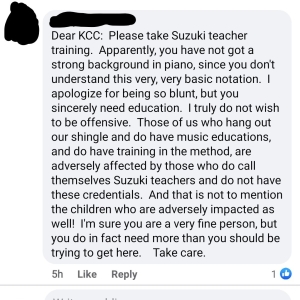A week or so ago, I had a very bad experience on Facebook; not an uncommon occurrence, considering the platform in a minefield for those of us with a sensitive spirit and people are often careless with their words. However, I feel the need to address this particular situation for the sake of Suzuki teachers (and students) everywhere. On the surface level, I could attribute this bad experience of mine to a woman, a fellow colleague, simply lacking tact. However, there are deeper elements and attitudes at play here that need to be exposed.
As a part of a Suzuki teacher Facebook group, I have periodically asked questions regarding strategies in working with certain students or parents, questions regarding curriculum or questions about trainings. I am usually met with excellent advice, encouragement, and helpful answers. In preparing to work with a student in book two, I had a question about one of the rhythms in a particular piece. I figured rather than traipsing around Google, the easiest and quickest way to find my answer would be to ask this highly-trained group of teachers, familiar with the curriculum including the specific song I had the question about. I received several helpful answers, and then I received this response.

Wow. Ok. First of all,
After I dealt with the initial anger of being talked down to, I thought to myself, “This is not how Suzuki teachers should act. This is not how any human being should act, but especially not a Suzuki teacher.” For those of you unfamiliar with the Suzuki method, the entire philosophy is based on the preface that musical ability is not an inborn talent, but that every child can learn. Suzuki is an extremely holistic approach, where emphasis is placed on building character and music is simply a channel to do so. Dr. Suzuki was once quoted as saying, “I don’t teach music. I teach children.” We teach our students virtues such as discipline, appreciation of beauty, perseverance, patience, and integrity.
How are we going to instill these qualities in our students if we treat each other with such condescension simply for asking a question?
Is the goal of our musical education to become part of an elite society where we lord our credentials over others? Dr. Suzuki did not treat people like that, and I think he would be highly disappointed in those claiming to teach via his method participating in such snobbery.
I did not go to college to study music. This is not to say I am unqualified. I studied psychology and worked in the mental health field for 4 years before deciding that I would like to devote my career to teaching piano. I had received Suzuki training as a student for 8 years from ages 5-13, then as an adult took Suzuki teacher training for books 1 and 2 (and am excited to be taking Book 3 later this month.)
I did not go to college to study music. This is not to say I am unqualified.
Do I know every detail of every theory notation? Nope, sure don’t. Is that necessary to be a good teacher? Nope, sure isn’t. In fact, I would argue that the best teachers are always learning. A good teacher has a sense of humility and isn’t afraid to ask questions or ask for clarity. A good teacher simply needs to know more than his/her students. I have no doubt that some of my students will eventually grow to the point where they are surpassing my knowledge, in which case it will be time for them to transfer to a more advanced teacher. (Hint, hint, I will NOT be referring to that lady!)
A good teacher has a sense of humility and is not afraid to ask questions or ask for clarity.
In our first Suzuki training class, the first questions our instructor asked us was, “What do you think of when you think of a Suzuki teacher? What makes a good teacher?” Spoiler alert: no one said, “someone with a music degree” or “someone who knows every detail of music theory.” They said things like: warm, caring, excellence, compassionate, approachable, patient, and kind. So many people (especially the parents of our students!) have had the grouchy old lady piano teacher experience. Let’s give our students something different.
So many people have had the grouchy old lady piano teacher experience. Let’s give our students something different.
Surprisingly, some of the most intelligent people make the lousiest teachers. The art of teaching is not simply in possessing the knowledge, but the ability to explain the material in a way that our students understand. To create an environment where our students feel safe to be transparent, because learning requires vulnerability. At the beginning of the school year, I came across a passage in the book, “The Soul of Shame” by Curt Thompson that I found extremely insightful:
“Though we usually think of learning as the acquisition of knowledge, we also acquire knowledge for the power it grants us. But acquiring knowledge depends on admitting that we do not know many things, that we need help from others in order to learn. Learning, in fact, is a declaration of vulnerability. We think nothing of this as young children; in fact, we are completely unaware of it. As we grow older, however, we become more distressed. We fear in the future we will be found to not know enough, to not have worked hard enough, to have not scored well enough. We will not be enough. To admit in our culture that we do not have our lives neatly packaged and wrapped, that we are a mess, that we need help from someone else is tantamount to blasphemy. To admit that we do not know something, are not good at something or have made a mistake— to be vulnerably known— is not one of our best skill sets. In revealing ourselves we risk the shame of not being the smartest person or class or school or nation in the world. We do not wear vulnerability easily or well […] As learners, we live as vulnerable creatures who need the presence of others in order for our education to foster an entire panoply of new objects of goodness and beauty.”
I was vulnerable in asking a question to a group where I felt safe to ask. Rather than my pride remaining wounded by one person’s harsh response, I am choosing to look on this debacle as a learning experience in multiple ways. I learned the answer to my music theory question (I purposefully am not sharing the question I asked, because it’s really not important. I don’t care if I had asked, “What is 2 + 2?” You don’t treat people like that.) More importantly, I was reaffirmed in what the Lord has been frequently reminding me, that when people are rude or unkind, that is a reflection on their character, not mine. In years past, I have struggled with poor self-esteem, where every little negative comment would send me into a tailspin of second-guessing myself, analyzing every word I had spoken in a conversation and questioning my abilities or my actions. I am happy to report that after a brief period of reflection, I concluded that yes, I can always stand to learn more about music theory, (it is a vast array of knowledge to be explored) but no, I do not need to fear that I am failing my students or making Suzuki teachers around the world look bad as this colleague implied. The latter part of the sentence is partially what inspired this post. Let it never be said of Suzuki teachers that we are condescending or rude: to students, parents, or each other.
Let it never be said of Suzuki teachers that we are condescending or rude to students, parents, or each other.
I’m not going to sit here and act like I didn’t have some choice words in response to that comment. I really was tempted to just go off on the lady. But after typing out my initial response, I held down the backspace button and rewrote my response minus the venomous reply I initially drafted. I did point out to the lady that her words were unkind and insulting and that I felt sorry for her students if she treated them in a similar manner. I was probably not as kind as I could have been, but under the circumstances, I am going to show myself some grace and not obsess about every word I said and beat myself up about it. Hey, progress!
In conclusion, this is an encouragement to my colleagues: let’s do better. I want to think that the majority of us started teaching music out of love in our hearts for others and wanting to share our gifts with others. We are on the same team. If you have a college degree in music, wonderful! Use it for good, to help those of us who may not know as much about notation, keeping in mind that we are all teachers, but we are also all students. Do not let the power of your position as teacher keep you from being a student. Each teacher has a unique personality and individual strengths (and weaknesses.) Let’s use our strengths to help equip each other, in love and with respect.


I couldn’t agree more. I have a similar background to yours, and my students are all the cream of the cream, musically, and are such a joy to teach. I have taken every advantage to learn more, and I have enjoyed the encouragement of a number of lovely Suzuki teacher trainers.
LikeLike
Boy oh boy could you and I compare notes! My degree is in Greek and Latin. I have been teaching music for 40 years with no small amount of success. I know my limits and send students on when it’s time. I don’t think a student should have the same teacher for all of his career anyway. I have just published an ebook on the art of teaching with interviews withfamous musicians. Whoever wrote that insulting response to you writes terribly, if that’s any comfort. The writer in me was squirming! Anyway, your point is very well made. One thing bears saying though – there are some pretty awful teachers out there who have every Suzuki qual you can get. Just as there are some great teachers who aren’t particularly trained but have a good heart, common sense, intelligence, a willingness to learn and the humility to ask questions. If you want to know more about my book, send me an email and I’ll send you the link.
LikeLike
Thank you for your feedback! And yes, I am always interested in a good book so def send me the info. I agree, there are some bad Suzuki teachers out there for sure and some great traditional teachers as well! I think people associate Suzuki with the curriculum and the ear training but there is ALOT of philosophy type stuff that many Suzuki trainers need to be retrained in that have to do with how we treat each other. (Building character, every child can learn, the parent-teacher-student triangle, quality over quantity, holistic approach, respect, etc.) There is so much more to the Suzuki method than just music.
LikeLike
Here it is! https://www.sharmusic.com/Digital/eBook/Hellyer-Eloise—1-Teaches-2-Learn-Private-Music-Teaching-and-You—Eloise-Hellyer—Digital-Download.axd
LikeLike